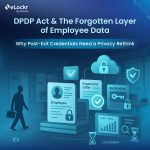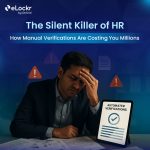Reference check is an indispensable element of the hiring process, serving as the bridge between a candidate’s past professional engagements and their potential future contributions to a new organization. This critical step goes beyond verifying the accuracy of a resume; it provides insightful glimpses into the candidate’s work ethic, interpersonal skills, and overall compatibility with the company culture. However, in the traditional approach, this process often teeters on the edge of efficiency and privacy concerns, hinging heavily on the subjective recollections of former employers and colleagues.
In an era where the Data Protection and Digital Privacy (DPDP) Act 2023 underscores the importance of consent and accuracy, the landscape of reference checks is poised for transformation. Companies are increasingly turning to innovative, technology-driven solutions to streamline this process, ensuring it is not only faster and more reliable but also fully compliant with legal standards.
These advancements offer a win-win scenario for both employers and candidates, promoting a transparent, consent-based approach that respects privacy while furnishing HR professionals with the verified information needed to make informed hiring decisions.
The Importance of Reference Checks in Recruitment
Reference checks play a pivotal role in the recruitment process, serving as a vital tool for verifying a candidate’s past employment history, skills, and character. A staggering 87% of organizations rely on reference checks, according to a survey by a leading HR management organization. However, traditional approaches to reference checks can be time-consuming, biased, and unreliable, significantly extending the overall recruitment lead time—a concern consistently raised within the HR community.
- Verify Resume Accuracy: They help verify the accuracy of the information provided by candidates on their resumes. Despite the initial screening processes, discrepancies or embellishments on resumes aren’t uncommon. Reference checks provide an additional layer of verification, ensuring that the candidates’ qualifications and experiences are as claimed.
- Understand Work Ethic and Performance: Beyond the resume, reference checks offer insights into the candidate’s work ethic, performance, strengths, and areas for improvement from previous employers or colleagues who have directly observed their work. This information can be invaluable in understanding how the candidate might perform in their new role.
- Assess Cultural Fit: Every organization has a unique culture, and finding a candidate who can thrive within that culture is crucial for long-term success. References can provide perspectives on the candidate’s ability to work within a team, adapt to company norms, and contribute to the workplace environment positively.
- Reduce Hiring Risks: Hiring the wrong candidate can be costly in terms of resources, time, and impact on team dynamics. Reference checks help mitigate these risks by providing a third-party assessment of the candidate’s previous job performances and behaviors.
- Legal and Compliance Considerations: For certain positions, especially those in sensitive or high-trust industries, reference checks are part of due diligence to prevent negligent hiring. They may be required to ensure that the candidate has no history of harmful behavior that could pose a risk to the organization or its clients.
- Professional Development Insights: For positions that require specific skills or leadership qualities, references can offer insights into the candidate’s professional development and potential for growth. Understanding how a candidate has evolved in their career can be crucial for roles that demand future leadership or specialized skills development.
- Enhances Hiring Quality: Ultimately, the goal of reference checks is to enhance the quality of hiring by ensuring that the selected candidate is not only qualified but will also contribute positively to the organization’s goals and culture.
eLockr Reference Check (EERF): A Digital Solution to Traditional Challenges
EREF emerges as a transformative solution, redefining how reference checks are conducted and complementing existing employment verification processes. This digital platform allows organizations to access employee references or credentials instantly, offering a modern approach to vetting potential hires.
One of EREF’s standout features is its ability to reveal references from undeclared employment records that may be omitted from a candidate’s CV due to various challenges such as termination, performance issues, or policy violations. This capability ensures employers can gain comprehensive insights into a candidate’s work history, significantly informing hiring decisions.
Enhancing Recruitment with Digital Reference Checks
The introduction of digital solutions like eLockr reference check marks a significant advancement in recruitment practices, offering several benefits over traditional methods:
- Speed and Efficiency: Digital reference checks significantly reduce the time required to verify a candidate’s background, streamlining the recruitment process.
- Accuracy and Depth: By accessing a vast database of references, including those not captured through legal verifications, employers can make more informed decisions.
- Reduced Bias: eLockr reference check provides unbiased feedback directly from previous employers, minimizing the risk of biased information influencing hiring decisions.
The Future of HR: Embracing Technology in Recruitment
The shift towards digital reference checks is indicative of broader trends in HR technology, where automation and digital platforms are increasingly utilized to optimize recruitment processes. As the workforce and workplace dynamics evolve, adopting such technologies becomes essential for organizations aiming to improve their hiring strategies, make better-informed decisions, and foster a more competent and trustworthy workforce.
Read Also: Digital Credentials: A Win-Win for Employees and Organizations
Conclusion
Reference checks are an indispensable component of the recruitment process, ensuring that employers make informed hiring decisions. The advent of eLockr reference check and digital verification platforms represents a significant leap forward in how these checks are conducted, offering a solution to the inefficiencies and limitations of traditional methods. As the digital transformation of HR practices continues, tools like EREF will become increasingly crucial in the quest for efficient, accurate, and unbiased hiring processes.





Leave a Reply